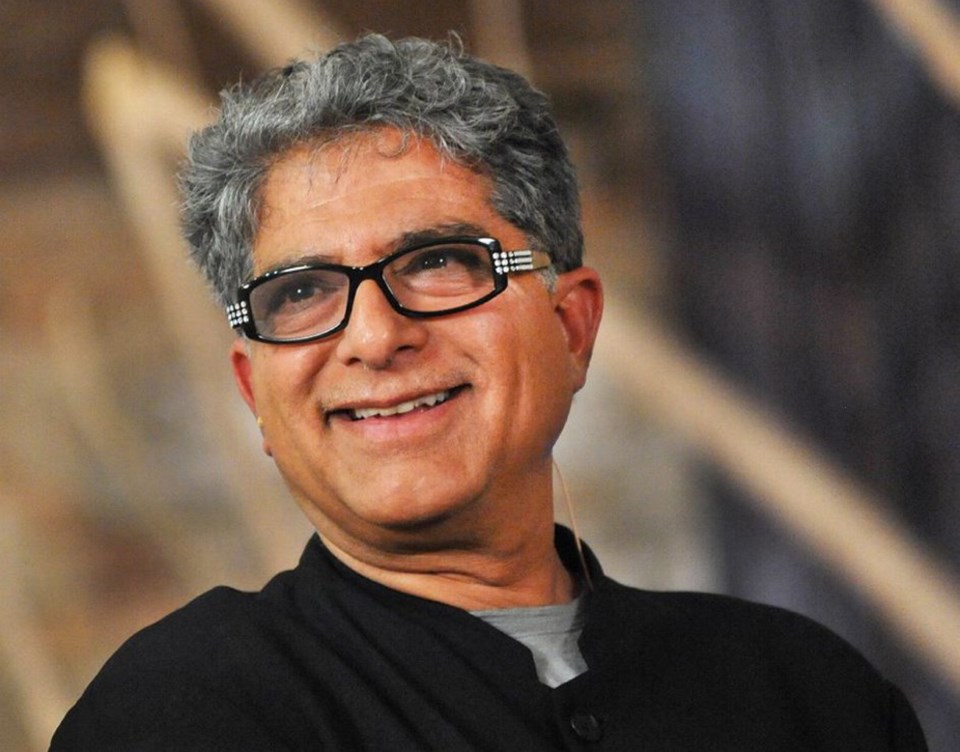Deepak Chopra, the new-age guru lecturing in Victoria tonight, seems to have mastered the art of summoning Zen-like focus.
He spoke to me recently from his New York City office. Soon after the conversation started, a phone started ringing. The ringing didn’t emanate from my end, however. And Chopra seemed equally mystified about the intrusion. Some kind of glitch.
“I don’t know where that’s from,” he said. “Let’s keep going. We can ignore this.”
Was this a test? Did Chopra want to see if I could keep my cool? Could I ignore this?
He began talking about tonight’s lecture at the University of Victoria Farquhar Auditorium. Chopra plans to speak about new research on meditation and how it influences cell biology and gene expression.
Ring, Ring!
“Man, I really hope this phone stops ringing,” I said.
“It’s, uh, not interfering with my concentration. So let it go,” Chopra advised.
“OK. So, is meditation the best thing we can do for our health?”
Ring, ring!
“Yes, meditation is (ring, ring!) probably the easiest way to allow your biological system to self-regulate itself. But other things are also important. (ring, ring!) Sleep is important. (ring, ring!). Exercise is important. There are certain breathing techniques that activate healing. (ring, ring!) Emotions influence your biology. And now, we know so much about something called the ‘microbiome,’ (ring, ring!) which is bacteria in our GI tract, and how it responds to food,” Chopra said.
The annoying ringing suddenly disappeared.
“OK. Hey, I’m so glad that phone stopped,” I said. “Oh, there (ring, ring!) it goes again. Do you think I could phone back?”
Chopra graciously gave me his cellphone number. The rest of the interview went smoothly.
At press time, Chopra’s lecture was approaching sell-out at the Farquhar Auditorium. It’s an impressive achievement, as the hall holds 1,000-plus, with ticket prices ranging from $62 to $200.
For those who haven’t watched The Oprah Winfrey Show, Chopra is one of the superstars of the holistic medicine movement. Time magazine deemed him “the poet-profit of alternative medicine.” He has sold millions of copies of his books.
His notions combine ideas from traditional Hindu medicine (Chopra was born in New Delhi) and mainstream medicine (he served as chief of staff at the New England Memorial Hospital before leaving to found the Maharishi Ayurveda Health Centre).
Chopra is famous for many things, not the least of which is his well-publicized spat with Richard Dawkins. Dawkins is a British evolutionary biologist and outspoken atheist who, not surprisingly, takes a scientific “seeing is believing” stance. Chopra, meanwhile, believes a “kind of cosmic consciousness” lies at the root of fundamental reality.
In Chopra’s view, one’s notion of the world is specific to one’s species. If you’re a cat, you see the world as a cat does; if you’re a parrot, you have a parrot’s viewpoint. So the very fact we’re human beings means we’re aware of some things and unaware of others.
As humans, we might have blinkers of which we’re unaware. This, says Chopra, is especially so if we believe the scientific method (conducting experiments, then making observations based solely on that) is the only way to view the world and beyond.
Dawkins is an advocate of Charles Darwin’s theory of evolution, with its emphasis on natural selection. Chopra, on the other hand, once remarked: “Charles Darwin was wrong. Consciousness is key to evolution, and we will soon prove that.”
On the phone, Chopra said: “The pendulum has shifted too far, with people like Richard Dawkins and his gang and his cronies. It’s called militant atheism ... they are as dogmatic and fundamentalist as religious fundamentalists.”
He said he doesn’t dismiss science — he just believes people must try to embrace a wider perspective of reality.
Science is the reason people are moving away from organized religion to embrace secular spirituality, Chopra said.
Religion, he said, is increasingly recognized as “cultural mythology.”
He added: “It’s difficult to believe in the Book of Genesis once you know about the Big Bang.”

-thumb.png;w=120;h=80;mode=crop)

